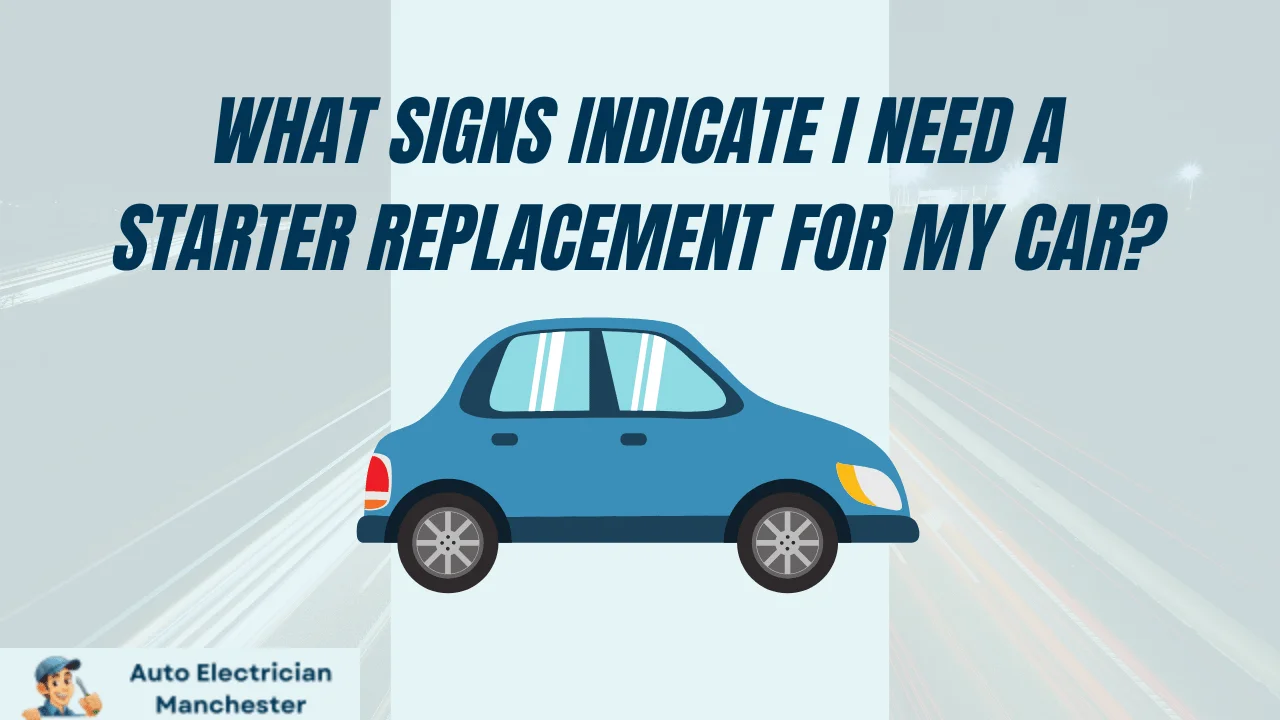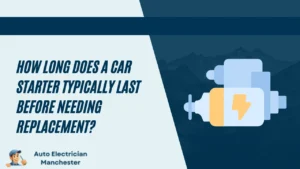
A healthy car starter is an unsung hero, whirring reliably behind the scenes to bring your engine to life. But just like any other hardworking part, starters can wear out over time, leaving you stranded and frustrated. Fortunately, there are telltale signs that your starter might be nearing retirement, allowing you to take action before you’re caught off guard.
This article equips you with the knowledge to identify these signs and empowers you to make informed decisions about your car’s care. Let’s delve into the world of starter motors and explore the symptoms that signal a replacement might be on the horizon.
Understanding Your Car’s Starting System
Before we dive into the warning signs, let’s establish a basic understanding of how a starter motor functions. When you turn the key or push the start button, a surge of electricity energizes the starter motor. This electric current creates a magnetic field that engages a gear on the starter motor with the flywheel, a large metal disc connected to the engine’s crankshaft. The starter motor then spins the flywheel, which in turn cranks the engine, initiating the combustion process and bringing your car to life.
Warning Signs Your Starter Might Be Ready for Replacement
A failing starter can manifest in several ways, some more dramatic than others. Here are the key signs to watch out for:
Unusual Sounds When Starting the Engine
Clicking: This is a common symptom that indicates the starter solenoid (the component that engages the starter motor with the engine) is functioning, but the starter itself lacks the power to crank the engine. The clicking sound is the solenoid rapidly engaging and disengaging.
Grinding: A grinding noise suggests the starter gear isn’t meshing properly with the flywheel. This can happen due to worn-out teeth on either gear or a misalignment issue.
Engine Refuses to Crank
This is a classic sign of a starter problem. When you turn the key and are greeted by silence instead of the usual engine rumble, a faulty starter could be the culprit. However, it’s important to note that a dead battery can also cause this symptom.
Slow Cranking
Even if your engine eventually starts, a sluggish crank can indicate a weak starter struggling to do its job. This sluggishness is often accompanied by a labored whirring sound from the starter motor. A slow crank can worsen over time, eventually leading to complete starter failure.
Smoke or Burning Smell During Starting Attempts
If smoke rises from under the hood or you detect a burning odor during starting attempts, it could signify a severe electrical issue within the starter motor. This is a serious concern and requires immediate attention from a qualified mechanic.
It’s Not Always the Starter: Considering Other Possibilities
While the signs mentioned above are strong indicators of starter problems, it’s important to remember that other car components can also malfunction and mimic these symptoms. A failing battery, for example, can cause clicking sounds, slow cranking, and even a complete inability to start the engine. Similarly, loose or corroded battery cables can impede the flow of electricity to the starter, leading to similar issues.
When in Doubt, Consult a Qualified Mechanic
If you experience any of the warning signs discussed here, don’t hesitate to schedule an appointment with a trusted mechanic. A professional can accurately diagnose the source of the problem and recommend the appropriate course of action. Early detection and repair can save you from being stranded and prevent further damage to your car’s electrical system.
How Much Does Starter Replacement Cost?
The cost of starter replacement can vary depending on several factors, including the make and model of your car, the type of starter motor required, and the labor rates of your mechanic. In general, you can expect to pay anywhere from [$200 to $[$600]] for a starter replacement, including parts and labor.
Can You Replace a Car Starter Yourself?
Replacing a starter motor can be a complex task, especially on newer vehicles. The process often involves accessing the starter motor from underneath the car, which can be challenging and may require specialized tools. If you’re not comfortable working on your car yourself, it’s best to leave the job to a qualified mechanic.
Conclusion
By familiarizing yourself with the warning signs of a failing starter motor, you can proactively address potential problems and avoid inconvenient breakdowns. Remember, a healthy starter ensures a smooth and reliable start every time you turn the key. Don’t ignore the warning signs – schedule a professional diagnosis if you suspect any issues, and keep your car running smoothly for miles to come.
FAQ
Can a dead battery mimic a bad starter?
Yes, a dead battery can cause clicking sounds, slow cranking, and even prevent the engine from starting altogether, mimicking a failing starter.

David Mack is a seasoned writer with a passion for the auto electrician niche. With years of hands-on experience and a knack for demystifying complex topics, David brings practical insights to his readers. Whether you’re a professional or a car enthusiast, his engaging articles offer valuable tips and trends in auto electrical systems.
